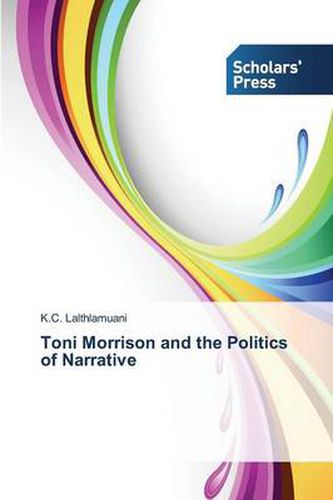Readings Newsletter
Become a Readings Member to make your shopping experience even easier.
Sign in or sign up for free!
You’re not far away from qualifying for FREE standard shipping within Australia
You’ve qualified for FREE standard shipping within Australia
The cart is loading…






This title is printed to order. This book may have been self-published. If so, we cannot guarantee the quality of the content. In the main most books will have gone through the editing process however some may not. We therefore suggest that you be aware of this before ordering this book. If in doubt check either the author or publisher’s details as we are unable to accept any returns unless they are faulty. Please contact us if you have any questions.
Fictional narrative is a social construct which evolves out of a long history which in turn defines the present. Narrative is, thus, a vehicle to convey the social bias or politics. Toni Morrison has shown in her narrative a specific concern with the identities of subordinated groups, to empower classes, races, genders. The first African-American to win the Nobel Prize for literature in 1993, Toni Morrison is a product of a community that has been historically and culturally subjected to racism and marginalization. Toni Morrison interrogates and documents white America’s representation of ‘race’ and ‘gender’. Her fictional works have a visible political agenda because she inverts traditional hierarchies that originate as far back as The Bible, and depicts conflicts that are extreme expressions of the double marginalization suffered by women and African-Americans. Narrative as a political practice determines the space for which one speaks, to whom, and for what purposes. The political stance affords narrative power, which pervades every level of social relationships. The present study negotiates Morrison’s narrative to explore the politically volatile issues of colour and gender.
$9.00 standard shipping within Australia
FREE standard shipping within Australia for orders over $100.00
Express & International shipping calculated at checkout
This title is printed to order. This book may have been self-published. If so, we cannot guarantee the quality of the content. In the main most books will have gone through the editing process however some may not. We therefore suggest that you be aware of this before ordering this book. If in doubt check either the author or publisher’s details as we are unable to accept any returns unless they are faulty. Please contact us if you have any questions.
Fictional narrative is a social construct which evolves out of a long history which in turn defines the present. Narrative is, thus, a vehicle to convey the social bias or politics. Toni Morrison has shown in her narrative a specific concern with the identities of subordinated groups, to empower classes, races, genders. The first African-American to win the Nobel Prize for literature in 1993, Toni Morrison is a product of a community that has been historically and culturally subjected to racism and marginalization. Toni Morrison interrogates and documents white America’s representation of ‘race’ and ‘gender’. Her fictional works have a visible political agenda because she inverts traditional hierarchies that originate as far back as The Bible, and depicts conflicts that are extreme expressions of the double marginalization suffered by women and African-Americans. Narrative as a political practice determines the space for which one speaks, to whom, and for what purposes. The political stance affords narrative power, which pervades every level of social relationships. The present study negotiates Morrison’s narrative to explore the politically volatile issues of colour and gender.